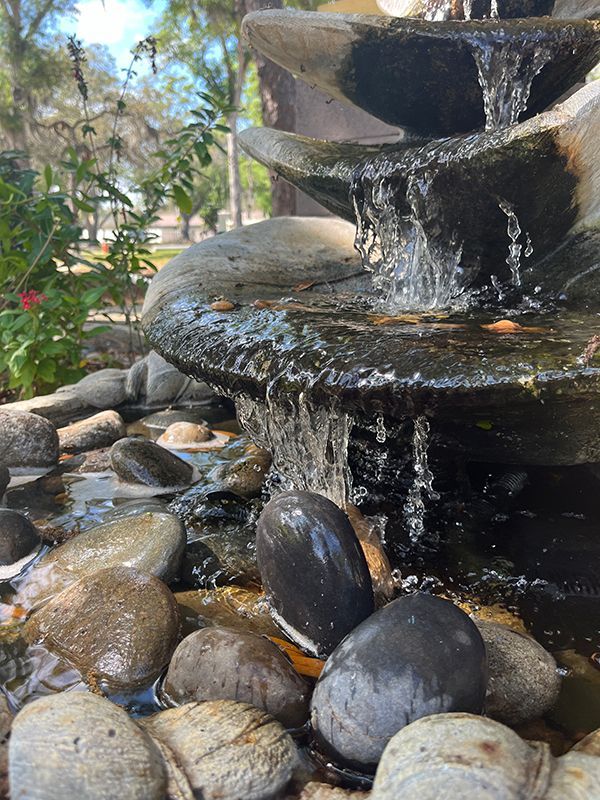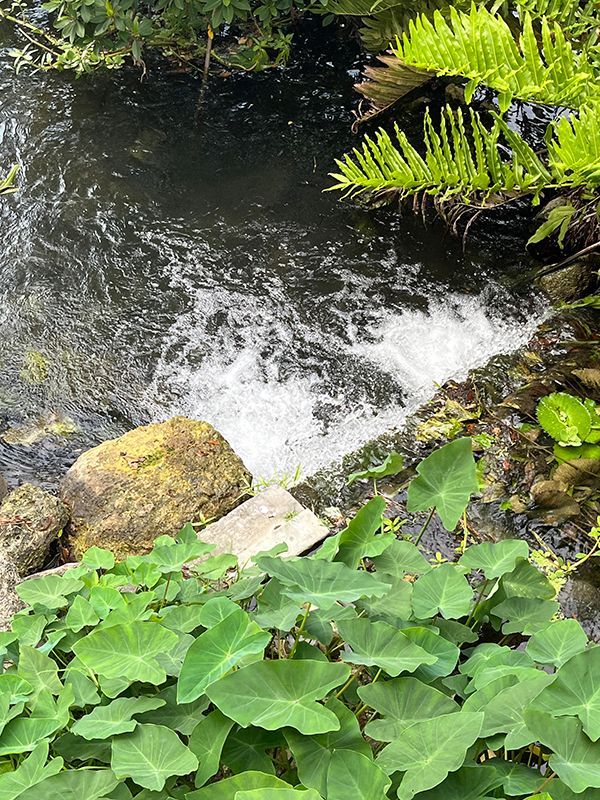Understanding the Nitrogen Cycle in Your Pond: Maintaining Balance with Natural Filtration and Healthy Bacteria
Everyone imagines crystal clear water and perfection when they envision a pond in their backyard. When this starts to falter, it can be challenging to understand what is creating the problem so it's helpful to understand a little more about one of the balances needed to preserve a healthy environment in your water garden. In this guide, we will discuss some procedures to maintain the vitality and well-being of your pond's ecosystem. The nitrogen cycle emerges as an approach to support pond health. Bacteria play a role in converting nitrogen compounds assisting in the natural filtration processes and improving habitats. Now let's explore the importance of the nitrogen cycle and its essential contribution to preserving the well-being of your pond's ecosystem.
Pondless Waterfall Installed in North Tampa, FL
ButtonHow does the Nitrogen Cycle keep a pond healthy?
The Nitrogen Cycle is a vital process for maintaining the health and balance of a pond ecosystem. It involves converting organic matter into various nitrogen compounds. Fish waste, rich in ammonia, plays a central role in this cycle. In ponds, specialized underwater bacteria transform this ammonia. Initially, some bacteria convert it into nitrite, which is then further converted into nitrate by another group of bacteria. Nitrate becomes accessible to aquatic plants and microorganisms. As the plants thrive, they eventually shed leaves and stems which start to break down in the water and initiate the cycle once again.
Rocks, gravel, and aquatic plants provide surfaces where nitrogen-processing bacteria thrive, enhancing the cycle’s efficiency. The more surface area underwater that is created by rocks, the more healthy bacteria can grow. These habitats allow bacteria to perform their crucial role effectively. Additionally, plants in the pond boost nitrogen absorption, contributing to water purification.
Even in fish-free ponds, the nitrogen cycle operates, albeit with fewer factors. As organic matter decomposes, it remains a source of ammonia, although at lower levels. Thus, maintaining a healthy nitrogen cycle is essential for overall ecological balance.
Ultimately, a harmonious interplay between natural biological filtration (via the nitrogen cycle) and mechanical filtration (through the use of a pump and filter) ensures optimal water quality and a thriving pond ecosystem. Prioritizing the nitrogen cycle is fundamental for a clear, healthy, and vibrant pond environment.
Some customers take this to another level by building aquaponic systems that connect to their ponds and specifically utilize the fish waste feces for fertilizer to grow fresh produce through a closed-loop system. We can help set up aquaponic systems for new ponds or existing ones.
How does a mechanical filter impact the nitrogen cycle, within a pond?
For individuals who own ponds and those with fish, grasping the significance of a filter in maintaining the ecosystem is vital. Envision your pond as an equilibrium of life, where fish, plants, and other organisms depend on water for their well-being. When debris such as leaves or twigs enters the pond it releases substances like ammonia and nitrite. You never want an excess of these chemicals, so this is why the mechanical filter or skimmer emerge as the hero of the pond which swiftly capture the organic components before they can cause harm.
Consider the filter like a vacuum cleaner designed for your pond. Using the force generated by the pump, it adeptly gathers debris like sludge and fragments of plant material that sink to the bottom. Its functionality extends beyond collection. In addition to a mechanical filter, you can also benefit from a skimmer which helps to collect leaves, pollen and other debris that land on the surface of the water before they have a chance to sink.
Picture a breeze gliding over the surface of your pond nudging all debris toward one side, for effortless removal. This is what a strong skimmer can do in combination with your filter. A strong pump serves as the powerhouse driving force behind this process by pushing water into the filter or reservoir to facilitate filtration. Water flow and circulation are important to prevent buildup of bacteria, but this will also aid in moving debris to the appropriate locations for removal from the pond. Depending upon the size of your water and the power of your pump, you can determine how often all the water is getting cycled through your system. Experts say that an ideal scenario is to have the complete volume of your pond water circulated once every hour. Like we talked about on the rocks above, healthy bacteria will also grow on your filter media which the water is constantly passing through.
Pondless Waterfall Installed in North Tampa, FL
ButtonWhat happens when there's an excess of nitrate in my pond?
Having excessive levels, in your pond can create issues that affect the overall well-being of the aquatic environment. Elevated nitrate concentrations may stimulate the growth of algae causing algae blooms that reduce oxygen levels in the water and could potentially endanger fish. This disruption can upset the balance of the ecosystem which imposes risk to fish health potentially resulting in conditions like blood disease. That's why it's crucial to manage levels by encouraging healthy plant growth minimizing waste buildup and using filtration systems. These approaches are vital, for preserving a pond environment and ensuring the well-being of its inhabitants.
At Focal Point Ponds, we provide a range of services tailored to meet the needs of our clients' ponds, which include testing water quality, cleaning ponds, and addressing any issues that may arise. When creating ponds we focus on implementing systems that work with proven processes to reduce maintenance requirements and maintain ideal conditions, for fish and water quality long term. Based in Tampa, Florida, we take into consideration the climate dynamics of the region to ensure that our pond designs are resilient throughout the subtle seasons of the year.
Harmony In Your Pond
When all elements of the cycle are working as they should, you'll have an extended period of time before algae grows or muck becomes too dense. Fortunately the processes in the nitrogen cycle happen without your intervention, but keep an eye on things you can help with. Don't overfeed your fish as the uneaten food adds to the waste in your water and increases ammonia. Empty your skimmer basket regularly and flush your filter to remove some of the sludge that it may pull in. This can be done weekly or should happen at least once a month. Test your water if things look very out of whack or your fish are showing unusual signs. Keeping a balanced healthy pond should not require a ton of work, but if neglected for too long, it may be a slow process to get all things back in check so your natural cycles are occurring again.




